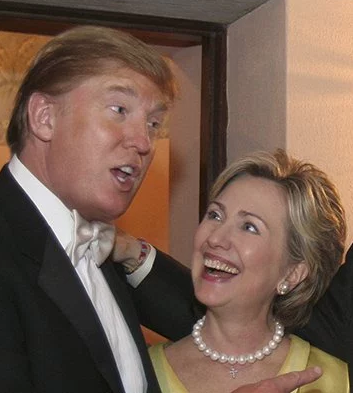At least I endorse her for voters living in purple states. For those living in red and blue states, I recommend voting for Gary Johnson. Since I live in Massachusetts, I plan to vote for Johnson. He’s far and away the best choice, which was not as true 4 years ago. Clinton is worse than Obama (more authoritarian/militaristic), and of course Trump is infinitely worse than Romney.
In past elections, I always voted for Libertarian, and didn’t view the differences between the main parties as being all that important. I pointed out that government grew faster under Bush than Clinton. There were some differences, but no clear advantage to either party. Many commenters (both progressive and libertarian) insisted that while that was true under Bush, the GOP was now much more the small government party, due to the ascent of the Tea Party. With the rise of Trump, that idea no longer even passes the laugh test. Trump may be the strongest supporter of big government that the GOP has ever nominated (with the possible exception of Nixon.) I was completely wrong about Trump having “no chance”, but I was totally right about the GOP not really being the small government party.
Update: PJ O’Rourke’s endorsement of Hillary is far better, as you’d expect.
The Trump phenomenon increasingly reminds me of the “cults” that were popular when I was younger. Charismatic leaders like Reverend Moon and Lyndon Larouche had dedicated followers who blindly accepted anything they said. (Are they still around?) I’ve noticed that Trumpistas in the comment section now defend any statement, no matter how absurd. “Trump wants to default on the US national debt? Great idea!—Let me explain why.”
If I could have any job right now, I’d probably most enjoy being the marketing person for the Clinton campaign. Where do you start? Perhaps with commercials showing all of Trump’s bankruptcies, and then Trump saying that he wants to solve America’s problems by having the US reschedule its debt. Hey, it worked for Greece!
But the Clinton people really need to be careful here, and hold some of their fire until after the convention. Trump is rapidly becoming the laughing stock of politics, and there’s a danger that it could reach a sort of “Thomas Eagleton” tipping point before the convention. Clinton needs to make sure Trump has the nomination in hand before tearing him to pieces.
PS. And now we discover that Trump supports a one time 14.25% wealth tax on the rich, another popular GOP idea. Seriously, even Bernie the Socialist Sanders didn’t go that far. BTW, “one time” taxes are a good indicator of corruption, of a banana republic-type policy regime. It’s time inconsistency on steroids. It’s all about making the Big Man look good for a few years, and let future generations suffer the consequences. The intertemporal equivalent of “America First—and to hell with the rest of the world.”
PPS. Of course I hope Clinton does not take my advice, and hits Trump so hard that he has to pull out before July. But that’s not likely, as ambitious politicians tell themselves that any short-term damage to the country required to get elected is a price worth paying for all the good things they’ll do as President. Clinton wants to win in a landslide, not a narrow victory over Paul Ryan. That’s how FDR justified not helping Hoover in the banking crisis of 1932-33. Taking office in the midst of a calamity gave FDR a free hand.
PPPS. When Clinton does a terrible job, don’t blame me for endorsing her. I warned you she is terrible. Blame the GOP voters who picked Trump, instead of someone like Kasich, who has a big lead over Clinton in the polls. The Trumpistas are going to allow a supremely unpopular Democrat to be elected (at least there’s a 75% chance they will.)
PPPPS. I see that a majority of former GOP presidential candidates are not going to vote for Trump. You know you’re in trouble when even most of your party leaders aren’t going to vote for you.
PPPPPS. I like these recent comments by President Obama (at Howard University commencement):
There was also a call for young black graduates to put themselves in the minds of others, police officers who may have bias or “the middle-aged white guy” who “you may think has all the advantages, but over the last several decades has seen his world upended by economic and cultural and technological change and feels powerless to stop it.”
“You got to get in his head, too,” he said.
Amid an election that has seen millions of white Republican voters embrace Donald Trump’s populist message, Obama tried to offer a strategy.
“There’s been a trend around the country of trying to get colleges to disinvite speakers with a different point of view or disrupt a politician’s rally. Don’t do that. No matter how ridiculous or offensive.”
“My grandmother used to tell me, every time a fool speaks, they are just advertising their own ignorance.
“Let them talk.”
Yes, let Trump talk—the more, the better!
HT: Foosion.


